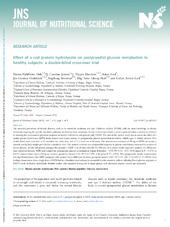| dc.contributor.author | Dale, Hanna Fjeldheim | en_US |
| dc.contributor.author | Jensen, Caroline | en_US |
| dc.contributor.author | Hausken, Trygve | en_US |
| dc.contributor.author | Lied, Einar | en_US |
| dc.contributor.author | Hatlebakk, Jan Gunnar | en_US |
| dc.contributor.author | Brønstad, Ingeborg | en_US |
| dc.contributor.author | Hoff, Dag Arne Lihaug | en_US |
| dc.contributor.author | Lied, Gülen Arslan | en_US |
| dc.date.accessioned | 2019-05-29T12:36:33Z | |
| dc.date.available | 2019-05-29T12:36:33Z | |
| dc.date.issued | 2018 | |
| dc.Published | Dale HF, Jensen C, Hausken T, Lied E, Hatlebakk JG, Brønstad I, Hoff DA, Lied G. Effect of a cod protein hydrolysate on postprandial glucose metabolism in healthy subjects: A double-blind cross-over trial. Journal of Nutritional Science. 2018;7:e33 | eng |
| dc.identifier.issn | 2048-6790 | |
| dc.identifier.uri | https://hdl.handle.net/1956/19817 | |
| dc.description.abstract | The increased prevalence of lifestyle diseases, such as the metabolic syndrome and type 2 diabetes mellitus (T2DM), calls for more knowledge on dietary treatments targeting the specific metabolic pathways involved in these conditions. Several studies have shown a protein preload before a meal to be effective in lowering the postprandial glycaemic response in healthy individuals and patients with T2DM. The aim of the present study was to assess the effect of a marine protein hydrolysate (MPH) from Atlantic cod (Gadus morhua) on postprandial glucose metabolism in healthy, middle-aged to elderly subjects. This double-blind cross-over trial (n 41) included two study days with 4–7 d wash-out in between. The intervention consisted of 20 mg of MPH (or casein as control) per kg body weight given before a breakfast meal. The primary outcome was postprandial response in glucose metabolism, measured by samples of serum glucose, insulin and plasma glucagon-like peptide 1 (GLP-1) in 20 min intervals for 180 min. In a mixed-model regression analysis, no differences were observed between MPH and control for postprandial glucose concentration (mean difference: −0·04 (95 % CI –0·17, 0·09) mmol/l; P = 0·573) or GLP-1 concentration (mean difference between geometric means: 1·02 (95 % CI 0·99, 1·06) pmol/l; P = 0·250). The postprandial insulin concentration was significantly lower after MPH compared with control (mean difference between geometric means: 1·067 (95 % CI 1·01, 1·13) mIU/l; P = 0·032). Our findings demonstrate that a single dose of MPH before a breakfast meal reduces postprandial insulin secretion, without affecting blood glucose response or GLP-1 levels, in healthy individuals. Further studies with repeated dosing and in target groups with abnormal glucose control are warranted. | en_US |
| dc.language.iso | eng | eng |
| dc.publisher | Cambridge University Press | eng |
| dc.rights | Attribution CC BY | eng |
| dc.rights.uri | http://creativecommons.org/licenses/by/4.0 | eng |
| dc.subject | Marine protein hydrolysate | eng |
| dc.subject | Fish protein | eng |
| dc.subject | Marine peptides | eng |
| dc.subject | Glucose metabolism | eng |
| dc.title | Effect of a cod protein hydrolysate on postprandial glucose metabolism in healthy subjects: A double-blind cross-over trial | en_US |
| dc.type | Peer reviewed | |
| dc.type | Journal article | |
| dc.date.updated | 2019-01-24T08:57:14Z | |
| dc.description.version | publishedVersion | en_US |
| dc.rights.holder | Copyright 2018 The Author(s) | |
| dc.identifier.doi | https://doi.org/10.1017/jns.2018.23 | |
| dc.identifier.cristin | 1637341 | |
| dc.source.journal | Journal of Nutritional Science | |

